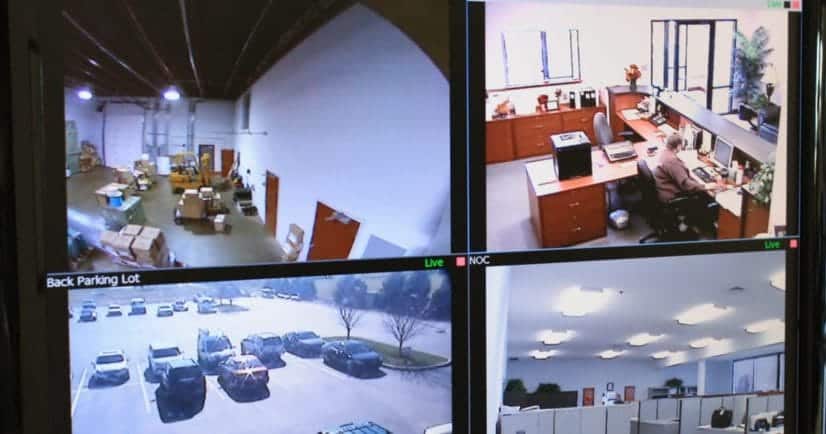There are many legitimate business reasons why employers choose to install CCTV or video surveillance.
- Asset Protection:</ Mitigating risks associated with physical assets. Protecting the buildings, major infrastructure elements, and everything in between.
- Health and Safety: Fostering a safe and healthy work environment, ensuring safety rules are being complied with and/or to provide footage in the event of a specific breach.
- Security: Keeping your employees safe and secure by preventing theft, violence and other crimes.
- Regulatory Compliance: Implementing monitoring tools to help meet industry specific rules and regulations, especially relevant in the financial services sector.
- Increasing Productivity: Assessing current practices to gain insight and implement changes needed to optimize employee and mechanical productivity.
When considering a CCTV installation, every business owner needs to understand the legal limits on video surveillance in the workplace and on the workers’ reasonable expectations of privacy. The employer must also ensure that the monitoring itself is legal. The first step should always be to execute an impact assessment to justify the use of CCTV/monitoring.
This process will help to clearly identify the purpose behind the monitoring and highlight both the benefits and adverse impacts you can expect to encounter. Understanding both the employer and employee side of the project is key to a successful implementation.
CCTV Impact Assessment
The goal of an impact assessment is to help justify the use for CCTV or video surveillance in the workplace. Business owners should consider the actual purpose behind the monitoring, the likely benefits, and also the adverse impacts.
This process will help you answer key questions for evidence-based policy making, leading the way for clear strategic decisions. Impact assessment data will enable you to do what is best for your business, as well as take into account the legal aspects of monitoring.
Understanding the CCTV Laws and Regulations
Business owners planning to install video surveillance cameras should become familiar with federal and state laws regarding privacy. There is currently no explicit prohibition or limitation in U.S. federal law against employers monitoring the workplace. However, federal laws do regulate specific aspects of privacy that arise during the employment relationship.
Federal laws will mainly impact private employers who have federal contracts or interactions with federal employees. These employers should be aware of the Federal Privacy Act and the restrictions outlined for the collection of information and regulations for specific record keeping obligations.
Another law which broadly applies to workplace video surveillance is the Federal Wiretapping/Electronic Communications Privacy Act. However, this Act lacks specificity in some areas, which leaves it to state governments to define what constitutes acceptable video monitoring practices in the workplace. Understandably, this leads to the legislation differing somewhat from state to state. To find out more about your state’s specific workplace privacy laws, contact your state labor department.
Workplace Video Surveillance Best Practices
Developing a consistent strategic plan for deploying video surveillance and implementing policies that comply with state & federal laws will help to protect your company from potential court cases. Below are a few suggested guidelines for adopting CCTV and video surveillance practices and policies:
- Communicate the nature, extent and reason for monitoring with staff and be clear as to what levels of privacy an employee can expect.
- Provide written policy statements about the monitoring.
- Explain how information obtained via CCTV and video surveillance will be used.
- Outline strict confidentiality guidelines for those involved in the monitoring.
- Give employees a forum to voice concerns and ask questions, in confidence.
- Create mutual trust and confidence by giving opportunities for employees to explain or challenge any footage used in disciplinary processes.
Developing a clear plan and well thought out policy for workplace surveillance is advantageous. By following a few guidelines and becoming familiar with the relevant federal and state laws, adverse impacts can be avoided and the benefits maximized.
Moving Forward with CCTV Implementation
The decision to implement CCTV can be complex, but being armed with a few guidelines and knowing which video surveillance laws to consider will start you on the right track toward success.
Selecting a partner who understands your needs and can carry out a detailed implementation plan is essential. Taylored Systems has dedicated knowledgeable staff who specialize in CCTV and video surveillance installations. For more information, please contact our staff today.

